Activities
Arndt presents at national network for TISUS assessors

On October 9, Henriette Arndt gave the plenary talk at the 2025 network meeting for TISUS assessors (Test in Swedish for University Studies). Drawing on experience sampling data collected with the Lang-Track-App (Arndt, Granfeldt & Gullberg, 2023), the talk highlighted the many different ways in which adult migrants in Sweden come into contact with Swedish throughout their daily lives. The plenary was followed by a panel discussion with former students from TISUS-preparation courses, who shared their experiences with applying and developing their language skills beyond the classroom.
TEAM Project 2 autumn gathering in Lund
During 6-10 October (2025), the members of Project 2 gathered in Lund for an intensive data analysis and project planning week. The experimental data from Study 1, aimed at investigating whether the meaning of the constituents of English noun + noun compounds such as bookshelf and honeymoon are available during orthographic processing, consists of reaction time and accuracy measures from a total of 96 participants. These participants are subdivided into an L1 Italian, an L1 Finnish and an L1 Swedish group, respectively. The three native languages belong to different language families (Romance, Finno-Ugric and Germanic), which potentially could affect processing. The experimental method used was a masked priming lexical decision task. In addition to analysing the data from Study 1, a plan for drafting a journal article based on the study was devised.
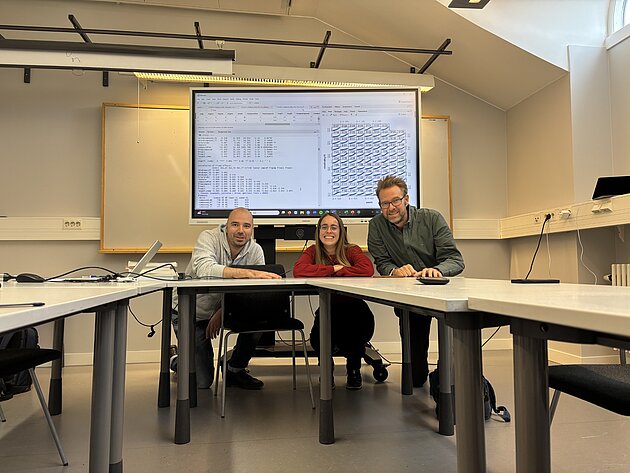
The members also engaged in discussing the purpose and Research questions for Study 2, for which a Visual World Eye-Tracking will be used as the main method. The discussions occasionally entailed the need for resourcefully illustrating lexical processing assumptions using whatever “props” were available.
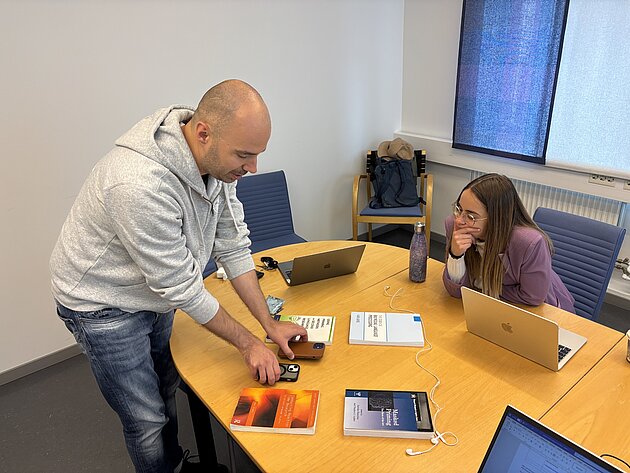
TEAM celebrates the European Day of Languages
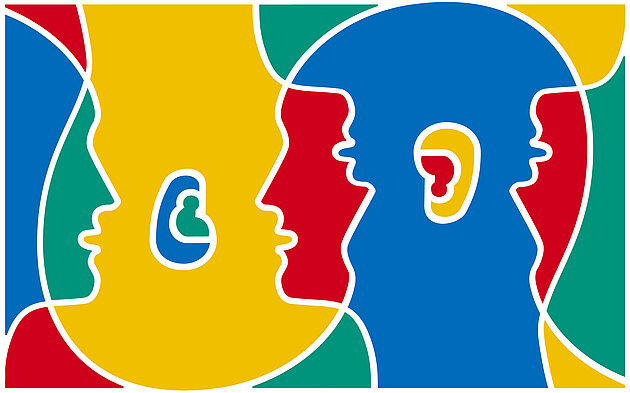
On 26 September (2025), the SOL reception turned into a celebration of multilingualism as TEAM marked the European Day of Languages. A large number of language enthusiasts participated, contributing to an event characterised by curiosity, lively discussions, and exploration of multilingualism.
We offered a series of interactive activities designed to highlight different aspects of language use and language learning. Visitors took part in an awareness-raising activity focused on language use outside the classroom, “survived” the Stroop task, and guessed the language in music videos. Participants also contributed to a joint, multilingual “translation quilt” of The Little Prince, where each participant contributed a sentence in a different language (sometimes more than one), creating a unique multilingual tapestry composed of sentences in 23 different languages. Particularly appreciated was the word-definition challenges where participants did their best to define words like stone, soft and (to) rattle.
The event successfully combined playfulness with reflection, highlighting multilingual skills in communication and everyday lives. We thank all participants for their engagement and for helping make the day such a success!
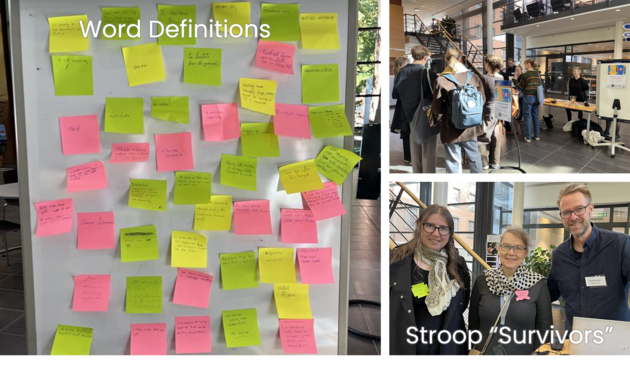
Fokus Framtid
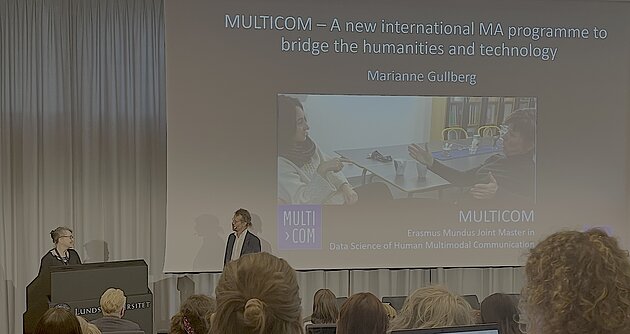
As part of Fokus Framtid (2025), a joint venture between Lund University and Alfa Laval, TEAM’s Marianne Gullberg presented MULTICOM, a new Erasmus Mundus Joint Master’s Programme designed to connect the humanities with data science in a focus on human multimodal communication. Developed in collaboration between the universities of Murcia (Spain), Lund (Sweden), and Erlangen (Germany), the programme will offer students a uniquely international education. When the programme launches in 2026, participants will spend one term at each university before choosing where to complete their final semester. The students will be able to choose to take their degree project in an applied or theoretical direction reflecting the programme’s interdisciplinarity.
As the final talk at event, TEAM’s Jonas Granfeldt talked about the future of foreign language learning and teaching, underlining the conditions for academic foreign language education and the needs for the future. These needs include national and international cooperation and flexibility in study forms. But he also stressed the need for more research on the role of foreign languages.
TEAM represented at EuroSLA 34 in Tromsø
The 34th edition of the European second language acquisition (EuroSLA) conference took place on 25–28 June (2025) in Tromsø, Norway. TEAM was represented through Project 2 and 4.
Henriette Arndt, Emma M.E. Geraerds, Jonas Granfeldt and Marianne Gullberg of P4 gave an oral presentation: Documenting language use among migrants in Sweden via the Experience Sampling Method and the Lang-Track-App.
Henrik Gyllstad, Lari-Valtteri Suhonen and Angelica Zordan of P2 presented a poster: Exploring morphological compound noun decomposition in L1 Swedish, Finnish, and Italian learners of L2 English.
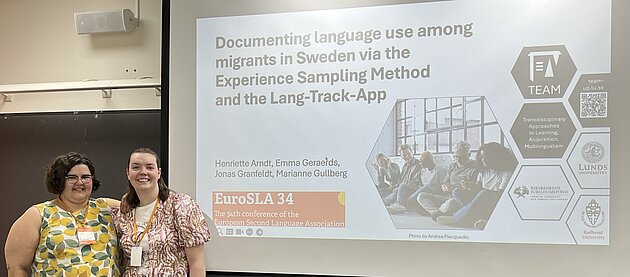
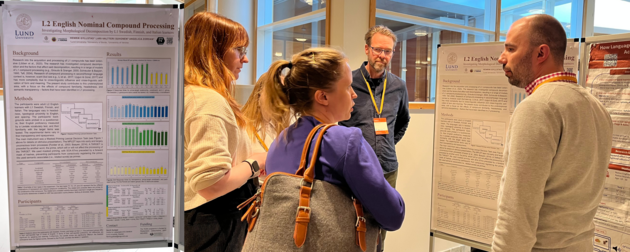
Internal piloting under way in Project 4
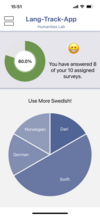
The members of TEAM Project 4 are currently piloting a brand new version of the Lang-Track-App (https://github.com/HumlabLu/HumlabLu) that now has four different options for visualizing users’ questionnaire responses: Pie graphs, bar plots, bubble charts, and an interactive puzzle that the researchers can customize to feed different types of information back to their study participants in addition to the donut chart from the classic Lang-Track-App, which shows users how many of the questionnaires they were sent they have completed. (2025)
Project 6 gives methods workshop in Hamburg

Mid-June (2025), Project 6 was invited to give a methods workshop on EEG for students and employees at the University of Hamburg (organised by the Institute of Slavic Studies). Sabine teamed up with researchers from the Institute of German sign language for a practical demonstration using their EEG equipment. The workshop was very well received and resulted in engaged discussions of the pros and cons of different research methods for assessing reading in second language and heritage language users. Many new contacts were made and existing ones reconnected with. A wonderful experience!
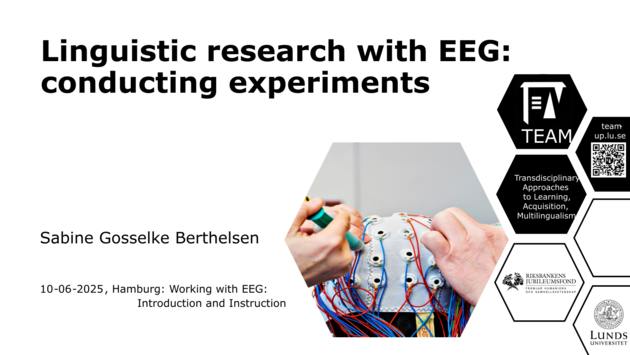
Internal training event on systematic reviews and meta-analysis
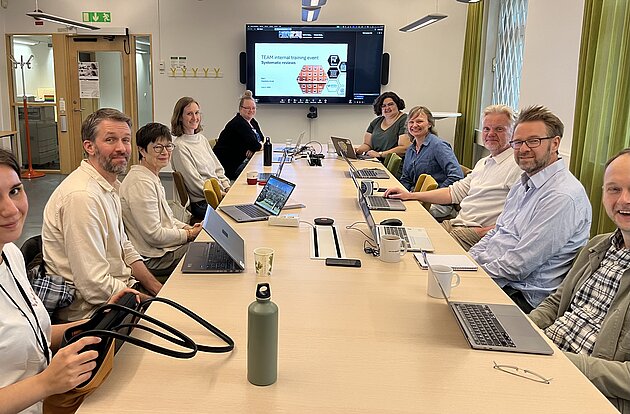
In early June (2025), TEAM hosted two connected internal training workshops focused on evidence synthesis methods. The first session, Systematic Reviewing (2 June), was led by Henriette Arndt and Sabine Goßelke-Berthelsen. Henriette introduced the rationale, types, and workflows of systematic reviews, while Sabine demonstrated how the tool Covidence can support the review process. The second session, Meta-Analysis (3 June), featured a prerecorded presentation by Luke Plonsky titled “Meta-analysis 2.0 in the language sciences: Current advances in synthetic methods”, followed by a live Q&A with Luke on topics such as when to do a scoping or systematic review and when to “push” to meta-analysis, and the biggest no-no of the meta-analysis process: not doing an adequately thorough search for primary literature and not giving the development (You don’t want any systematic bias to make it into your effects!) or not taking the time to thoroughly develop the coding scheme. Together, these workshops provided TEAM with a comprehensive overview of key research synthesis methods.
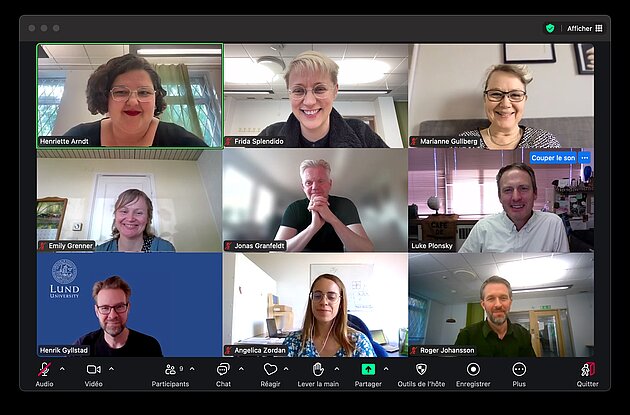
Data Collection Report from Project 2
It is currently a busy data collection period for the members of TEAM Project 2. The first study, a masked priming lexical decision task experiment, is aimed at investigating levels of decomposition during orthographic processing of English noun + noun compounds (e.g., bookshelf and honeymoon), as well as effects of semantic transparency. Data will be collected from native speakers of Swedish, Italian, and Finnish.
At the beginning of April (2025), Lari-Valtteri Suhonen went to the University of Turku, Finland, to gather data from native speakers of Finnish. Lari’s work was greatly supported by Associate Professor Ilmari Ivaska, who helped with providing a suitable room for the data gathering, announcing the study in university channels of communication, and various other generous and indispensible help. Whilst in Turku, Lari also gave a talk on experimental methods in second language vocabulary research.
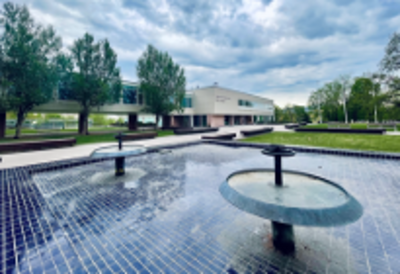
At the time of writing, Henrik is in Verona, Italy to collect data from native speakers of Italian at the University of Verona. Angelica Zordan, the third member of the project researcher team and a doctoral student of Linguistics in Verona, was a great host and created excellent conditions by providing access to the LaTeC lab, booking volunteering participants, and generally spoiling Henrik with culinary highlights from the rich Italian food repertoire. In the coming weeks, Angelica will continue data collection in Verona, and Henrik in Sweden.
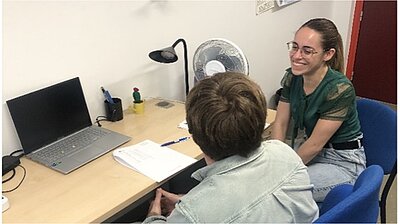
New postdoctoral researcher in Project 5
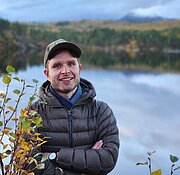
We are excited to welcome our new colleague Kirill Elin, who will work as main researcher in Project 5 on language switching. Elin will work as postdoctoral researcher at the Department of Psychology in Lund, alongside PIs Roger Johansson and Mikael Johansson. Previously, Elin was a postdoctoral researcher at The Arctic University of Norway, with a focus on investigating how bi/multilingualism contributes to neurocognitive adaptations across the lifespan. (April 2025)
P1 give talk at Greek colloqium
On 3 April (2025), the members of Project group 1, Kristina Hansson, Emily Grenner and Ida Rosqvist, gave a talk at an annual colloquium organized by the Linguistics specialization of the Department of Philology at Democritus University of Thrace (DUTh), Greece. The audience was undergraduate students, PhD students, researchers and members of the general public, for example educators. The title for the talk was Word definition skills: Explaining variability. The complex interaction between factors within and around the child. The talk showcased past and current research on factors explaining variability in children's word definition skills and its connection with formal schooling, with a special focus on bi/multilingual children. Furthermore, methodological considerations as well as possible future research projects were discussed.
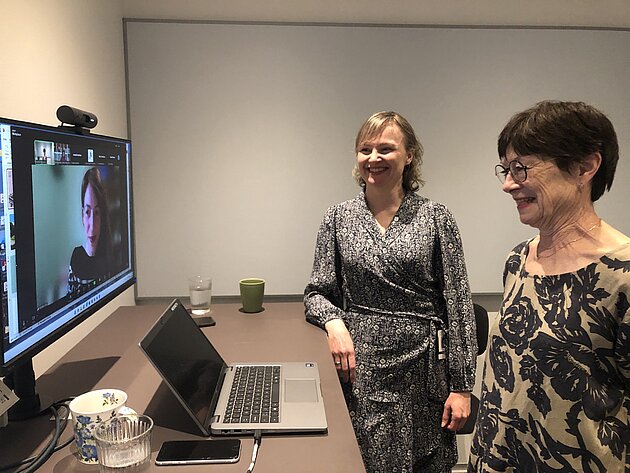
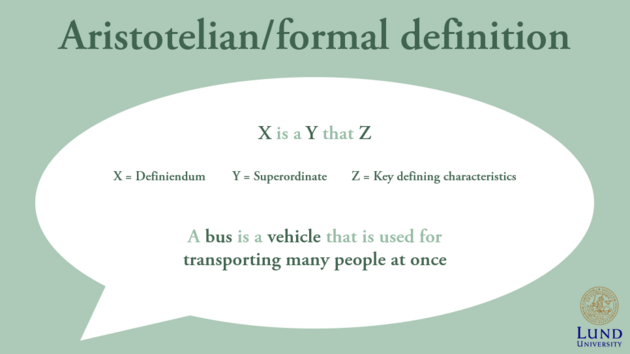
TEAM Retreat 2025

At the end of February (2025), the PIs gathered for a retreat to reflect on the past year's activities and plan for the future, with all six initial projects now underway. On the first day, we focused on RJ's self-evaluation, discussing selected questions from the projects and addressing our needs, joys, and frustrations. The second day was forward-looking, starting with discussions based on the program's GANTT chart, which led to the formation of three groups to develop training, stakeholder events, and an MA course. We concluded the retreat with a discussion on the government's research proposition and its potential impact on our research environment.
Project 1 represented at Vocabulary Development in Bilingual Children II
On 24 January (2025) Ida from Project 1 gave a talk at the workshop Vocabulary Development in Bilingual Children II, organized by Ute Bohnacker and Pascale Wehbe from Language & Learning Network (Nätverket Språk & Lärande), Uppsala University, Faculty of Languages. The topic for Ida's talk was Explaining variability in elementary school children's word definition skills. The talk showcased past and current research on factors explaining variability in children's word definitions and its connection with schooling, with a special focus on bi/multilingual children.
Other speakers at the workshop were:
- Ute Bohnacker (Uppsala University) "Vocabulary development in 4-7-year-old Turkish/Swedish and Arabic/Swedish children (Uppsala BiLI-TAS project)"
- Pascale Wehbe (Uppsala University) "Exploring vocabulary development in a longitudinal study of Arabic-Swedish-speaking children"
- Natalia Gagarina (Leibniz-ZAS Berlin) "Lexicon and around: Old topic – new insights"
- Magdalena Łuniewska (Warsaw University) "Beyond Accuracy: Expanding Perspectives in Vocabulary Tasks"
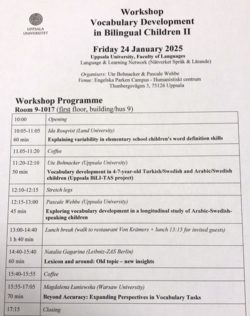
– 2024 –
First installment of the "Local Guest Researcher Scheme"
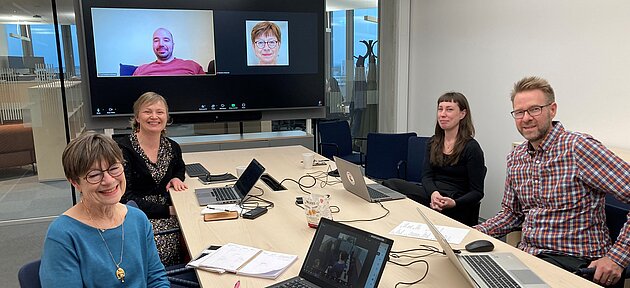
On 5 December (2024), Henrik and Lari from Project 2 visited Project 1 as part of the "Local Guest Researcher Scheme". This activity was made part of the TEAM research program to foster cross-fertilization and share insights and research skills across projects.
In the session, we described the main features of our respective projects. Ida, Emily and Kristina elaborated on their planned test battery, and we discussed criteria for the selection of words for the word definition task to be used in the upcoming study. Project 1 also explained the status of their ongoing scoping review on children's word definition skills. We did five initial full-text reviews together and discussed criteria for inclusion and exclusion. It was a useful experience. Explaining to others what you do deepens your own understanding. We will all meet again soon for a second session.
Project 1 at the NKL2024
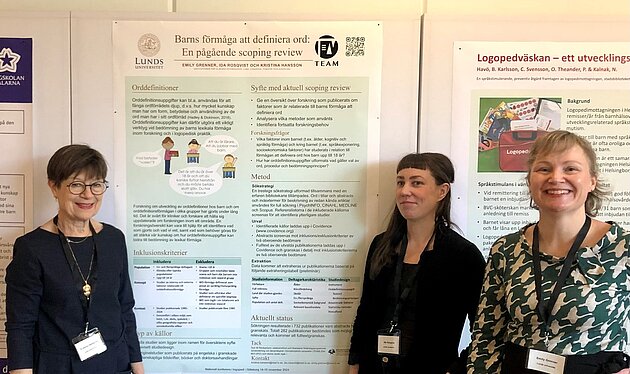
At the NKL2024 Conference (Nationell Konferens i Logopedi/National Conference in Speech-Language Pathology) in November, Project 1 presented a poster with the title Children’s ability to define words: An ongoing scoping review. The poster presented the aim and method for an ongoing scoping review with the objective to map which factors have been studied as associated with WD skills, as well as to summarize the methodological characteristics of the WD tasks used in the included studies.
The protocol is available at:
Grenner, Emily; Rosqvist, Ida; Hansson, Kristina (2024). Internal and external factors explaining variability in children’s word definition skills: A scoping review protocol.pdf. figshare. Online resource. https://doi.org/10.6084/m9.figshare.27692643
At the NKL2024 Conference we also gave an oral with the title Assessment of children’s word definitions: Possibilities and challenges in clinic and research. We talked about how word definitions can be used to assess several aspects of language and communications skills, and the use of WDs in a school context. Furthermore, we talked about challenges when assessing and analyzing children’s WDs and the aim of the TEAM research project Word definition skills: explaining variability. The complex interaction between factors within and around the child.
Journal Club: Measuring Vocabulary
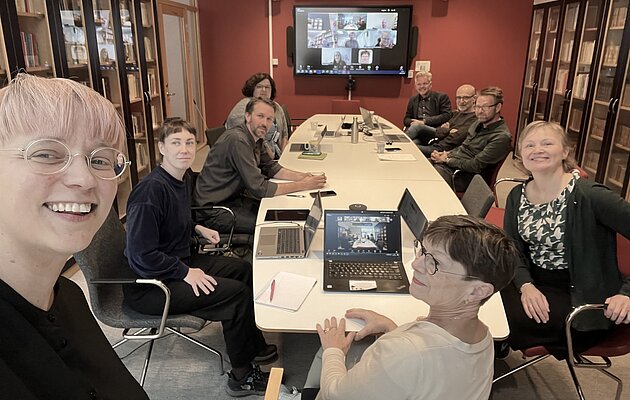
On 1 October (2024), TEAM members gathered for the first Journal Club of the autumn term. Ida Rosqvist, Kristina Hansson and Emily Grenner from Project 1 led a stimulating discussion on Hadley and Dickinson's (2020) paper exploring vocabulary depth. The conversation was both lively and engaging, covering a broad range of topics, including vocabulary assessment across different fields and key considerations for designing tools to measure children's word definition skills.
Arndt gives guest lecture at the Tilburg Experience Sampling Center

On September 19 (2024), Henriette Arndt gave a guest lecture at the Tilburg Experience Sampling Center which provides training and support in conducting Experience Sampling Method (ESM) studies, primarily to local researchers in psychology and medicine. The talk showcased past and future projects in which Arndt and colleagues leverage the ESM to investigate everyday language use (see Project 4; the LANG-TRACK-APP), thereby illustrating the method’s potential applications and benefits in a novel research area – the study of learning, acquisition, and multilingualism.
Conference reports from Project 1
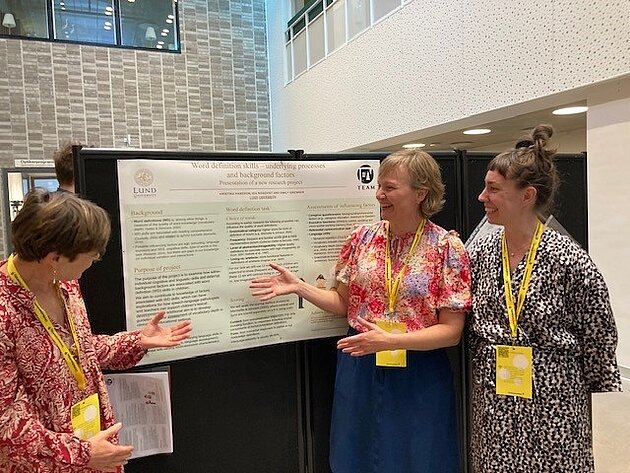
Project 1, Kristina Hansson, Emelie Grenner and Ida Rosqvist, gave several conference presentations in September (2024). These are their reports.
At the International Developmental Language Disorder Research Conference we gave an oral presentation: Word definition skills in Swedish children with a history of SLP contact. An exploratory study. Using data from a previous project involving children in school year 1 and 2 we compared a subgroup of the participants (35 out of 205) who, according to parent report, had seen a speech-language pathologist (SLP) with those who had not had any SLP contact. This subgroup performed significantly below the rest of the participants. Given that the reasons for SLP contact often were other than DLD (e.g. stuttering or speech sound disorders) the fact that this group tended to score lower indicates that word definition skills in Swedish children with DLD deserve further investigation.
At the Educational Linguistics (EdLing) conference, we presented a poster: Word definition skills – underlying processes and background factors. Presentation of a new research project. We presented the purpose of the project, i.e. to investigate how executive function, referential communication, lexical and grammatical skills, and background factors contribute to word definition skills in children representing a variation of language skills, language background and exposure, and socio-economic conditions. We also presented our planned design, with a focus on factors to take into consideration when selecting targets for the word definition task.
At EdLing we also gave an oral presentation: Word definition skills in the early school years. We presented two previous studies investigating WD skills in monolingual and bi/multilingual school children and the effect of a teacher Continuous Professional Development program on students' WD skills. The results were discussed in relation to our upcoming research project investigating the interaction between linguistic, cognitive, and social variables shaping variability in WD skills. Project 1 in TEAM focuses on questions that were identified for future research in the presented study.
TEAM Eye-Tracking Course
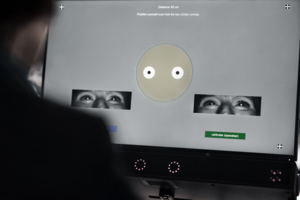
An eye-tracking course was organised for TEAM members in April–May 2024. Participants learnt about eye-tracking theory and methodology as well as applications to the specific subprojects. The course was given through Lund university Humanities Lab.
Project 2: Seminar on Compounding
On 5 April (2024), Project 2 organised an informal seminar on compounding, with the purpose to further the understanding of compound structures, compounding processes in the English, Finnish, Italian, and Swedish languages, and identify challenges for cross-linguistic comparisons. Presentations by project members and invited guests on different topics were followed by a discussion that aimed to identify salient points and challanges.
